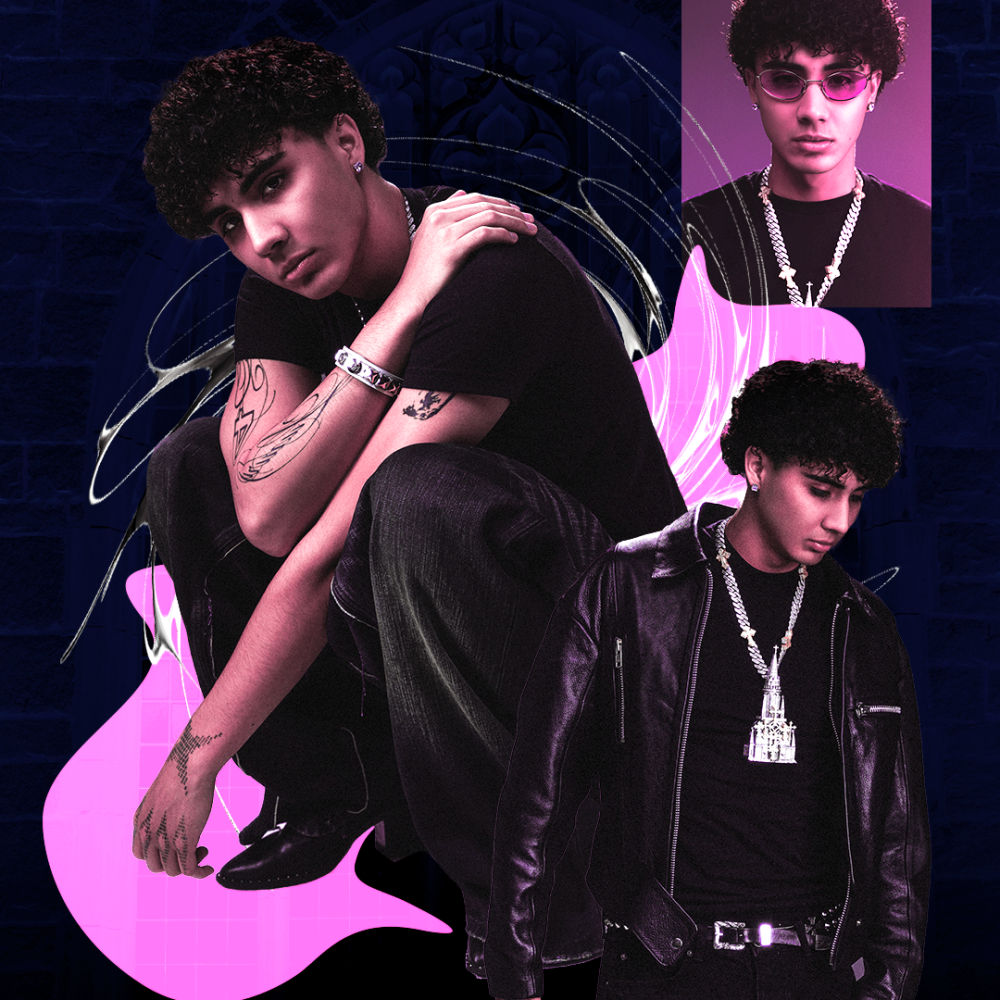
- Share via
DannyLux turned 21 not that long ago. Yet the perpetual sad boy is already contemplating the extent of his mortality — and his legacy.
“Whenever I die, I really want to feel like I did something to help people with my sad songs, even though they’re sad songs,” says the singer-songwriter in a video call.
This reflection is the basis for the crooning sierreño’s newest album, “Leyenda,” released on May 15. His latest project is composed of 19 tracks that crystallize his signature melancholy, emitting an aura far less flashy than the diamond-encrusted Gothic cathedral pendant swaying around his neck.
“I named the album ‘Leyenda’ because we went through so many obstacles when making this album,” says DannyLux.
The legend behind the album’s title began with a hard drive containing the original songs for this project, which were stolen by a robber who broke into his engineer’s rental car. The story evokes a real-life Shakira moment from the ‘90s, when a briefcase containing songs written for her fourth album was stolen at an airport in Bogotá; the immense loss would inspire the title of her famed 1998 album, “Dónde Están los Ladrones?”
Much like the Colombian singer, the incident motivated DannyLux to write entirely new songs. “It’s not gonna be the same emotions that I had while I was recording those previous songs,” he says.
The dense strumming of the bajo quinto echoes across the entire LP, but most prominently in “Sirena” — with a bewitching, Beatles-like melody that encapsulates the spirit of the record. As with most of DannyLux’s rich discography, “Leyenda” bends the rules of traditional regional music with the use of wah-wah pedals and reverb effects, giving way to sonic bliss. Songs like “Carrusel Eterno” and “Ten Piedad” make memorable psychedelic-pop fusions, while the electric guitar riffs in “Todo Cambio” and “Mis Loqueras” (which features vocalist Juanchito) highlight DannyLux’s rock star capabilities.
Still, he says, “the songs on this album were the saddest songs I’ve ever made.”
In a genre long dominated by men sporting cowboy hats and five o’clock shadows, DannyLux offers fans a softer side to Mexican regional music.
Born in Palm Springs to Mexican parents, DannyLux learned to sing and play guitar at church before posting cover songs on TikTok. He made his own musical breakthrough in 2021, after writing the teen heartache anthem “Jugaste y Sufrí,” which he recorded with Eslabón Armado. The song’s success earned DannyLux the No. 1 spot on Billboard’s Latin Songwriter’s Chart, after which he signed with Warner Music Latin. Last year, he received his first Latin Grammy nomination in the category of best contemporary Mexican music album, for his 2023 LP, “Evoluxion,” a deluxe version of his 2023 debut, “DLux.”
In the days leading up to the release of “Leyenda,” DannyLux unveiled its accompanying short film by the same name, which illustrates an alternate reality to what his life might have looked like if he did not pursue his passions. Would a dark possessing figure, simulating his desire for musical success, haunt him like a ghost in a castle? The push-and-pull of “Leyenda” marks a turning point in his early career, from a once-bedroom covers artist to headline-worthy act.
This interview has been edited and shortened for clarity.

Why did you name your album “Leyenda”?
While making it, we didn’t know if we were gonna be legends, but we already felt like we [creating a legacy]. We felt like these songs were gonna leave a mark. We would be working on one of the songs, listen to it and say: “With this one we’re gonna turn into legends.” That stuck with me. Whenever I die, I really want to feel like I did something to help people with my sad songs, even though they’re sad songs. Whenever we as humans hear somebody express their feelings, you feel less alone.
Who were some of your musical influences this time around?
I was listening to a lot of indie stuff, mainly the new album [“Equus Asinus”] by Men I Trust. Some of the songs I added later were inspired from that vibe — those nostalgic, weird psychedelic chords and a lot of old rock songs too. At the end of the day, music just doesn’t have any rules, you know?
Where did you write most of these songs? How did you get in the zone to write them?
We had recorded a bunch of songs and one day we went to celebrate my engineer,David’s birthday. Once we left the restaurant, [his] car windows were broken. They robbed his backpack and it had the computer with all the songs. The USB, hard drives, all the backups were in that backpack.
We obviously didn’t get it back so we had to re-record everything. That era was so stressful because we had a tour in Mexico two days after that and they stole his passport too. So we had to change a lot of plans. We still had three demos that I really liked from the songs that were stolen — “No Pasa Nada,” “Instincto Natural” and “Carrusel Eterno” — [but] to re-create the [other] songs was not gonna be the same.
Right after the tour, I rented a house in San Diego for a week and the whole team was locked in there, just writing, writing, writing. I was going through a lot mentally. I had so many things on my mind, relationship-wise. I was just really low during those times, [but] it just clicked. This album was my therapy.

Tell me more about the concept for the short film. What story are you trying to tell?
The main concept was: What would’ve happened if music never did what it did with my life? In this short film, [I’m] working as a waiter, taking orders and feeling really disconnected from everything. Even in another universe, I knew [that] wasn’t what I was meant to do. Music just kept calling me.
When you listen back to your breakthrough hit “Jugaste y Sufri,” what comes to mind?
That song kick-started my career. When I wrote that song, I was really sad. I feel like sad songs stay longer with you than any other type of song you listen to; two negatives equal a positive. Ever since [that song] I’ve learned more chord progressions. I’ve learned more Spanish. It’s so sick how in music, you can literally do whatever you want. I feel like I’m a painter and the songs are my portraits. I can use any colors I want, you know?
More to Read
The Latinx experience chronicled
Get the Latinx Files newsletter for stories that capture the multitudes within our communities.
You may occasionally receive promotional content from the Los Angeles Times.








